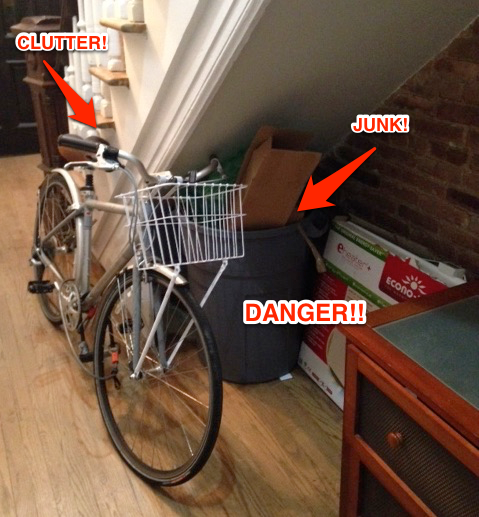A friend recently moved into the third floor of a three-unit converted brownstone in Bed-Stuy. Whenever guests come over, he politely asks that they remove their shoes and leave them in the hall prior to entering the apartment. A fastidious habit, for sure, but not uncommon. (In exchange, he offers each guest a pair of hotel slippers.) When he had a housewarming party a couple of weeks back, however, his no-shoe policy resulted in a tangle of boots and sneakers overflowing along the third-floor landing.
While this “shoes-off” request results in a temporary situation, on the second-floor landing of my friend’s apartment building there appears to be a semi-permanent collection of clutter, including a bookcase filled with shoes and around the corner, two bikes complete with baskets and over-sized saddled bags and other junk (photo below):
Neighbor disputes
The use of public common space for the storage of personal items is a typical apartment grievance and can be a difficult territory to navigate between neighbors. Recently, greviences over shared hallways at The Kenilworth Co-op on Central Park West has escalated to a legal battle with one neighbor suing his next door neighbor. As in this case of the Kenilworth co-op and in many other buildings across the city, both the Downstairs Dwelling Guy (DDG) and the Uptight Upstairs Guy (UUG) have their points. Apartments in New York City are small and the hallway becomes the area for personal “overflow” and personal tastes, as is the case for the Kenilworth lawsuit.
So, does it really do any harm to store your bike outside your apartment? And plus, wouldn’t the landlord prefer you storing it there as opposed to the interior of the apartment where it can scratch up the floors? But, this is how it starts. Someone begins by storing their shoes in the hallway, someone else a bike and then a bad precedent is set, which leads to a downward spiral of your communal hallway turning into an elongated storage locker.
What does your lease say?
Because space is tight and the hallway is communal, how do you avoid starting the next cold war? Steal the shoes, pound down the door? No. The first step is to consult your signing documents. If you’re a renter, look over your lease to see if there are any statements about the use of common space for personal property. If you live in a co-op, the board has surely outlined the rules, so refer to your handbook. By law, the owner of a building — whether it be the collective co-op board, the management company or the landlord — is required to ensure that residents are not subject to situations or environments that would jeopardize their safety. For example, the FDNY deems bikes, strollers, skates and other cumbersome objects left in the hallway a fire hazard. As a result, many buildings prohibit the storage of just about anything in the common areas.
Hallway is subject to FDNY code
You can review the FDNY’s code here, but the main takeaways are as follows.
- Building lobbies and hallways are allowed to feature consoles, benches, artwork and umbrella stands that do not block the exit
- Lobbies and hallways may not have other types of decorative furniture such as dining room tables, beds, etc.
- Bikes, strollers, clothing and personal property may not be stored in building hallways
- Household garbage may not be stored in building hallways
- Artwork is OK to hang in the hallways
What to say to your neighbor
If you find that any of these rules are being violated in your building, you can broach the subject with your neighbor by writing a note. The articulation and phrasing of this note will no doubt be difficult, but if you address the situation as soon as you notice it happening, you’ll have a better chance of nipping it in the bud. Don’t worry about offending your neighbor or coming off as overly persnickety. Simply state the facts. Storing personal belongings in the common hall isn’t allowed.
In the note, You could follow up with a question, “Do you intend this to be a temporary storage solution?” Also, if you use a local commercial storage company for your overflow, offer that as a recommended idea. If your neighbor is leaving heavy items, such as a stroller or bike in the apartment’s foyer and it’s really bothering you, you could even offer to help schelp it up the stairs or at the very least keep an eye on the kid while your neighbor does it. If your note goes unacknowledged, mention it to your neighbor directly the next time you cross paths with a simple, “Hey there — I’ve been wondering if you got the note I left…”
In that conversation, simply reiterate what you stated on the note. Acknowledge that you understand apartments are small, but it’s a building policy. If that doesn’t yield any change, then you may wish to contact your landlord or the management company. If your landlord is on top of it, he should appreciate your concern and take it up with your neighbor himself. If you’ve got one of those direlect landlords you may have to get more aggressive.
You can threaten to contact the FDNY who will level a fine against the building if there are code violations. That should encourage your landlord to take action, but if it doesn’t and you are very adamant about the issue, you can file a complaint with the fire department yourself.
If the hassle or potential awkwardness of confronting your neighbor is daunting to you, you should reassess how much of an annoyance or danger the issue is. It is up to you how to proceed, but if you do encounter a neighbor take advantage of common space to store personal property, you are well within your rights to speak up.
Related:










